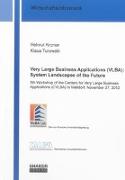Very Large Business Applications (VLBA): System Landscapes of the Future
BücherAngebote / Angebote:
The role of IT's use in business evolved over the past fifty years from isolated applications to integrated IT system landscapes. In this development, the focus and boundaries of business applications extended continuously. In order to consolidate research in this area, the term Very Large Business Applications (VLBA) was defined.
A VLBA neither has geographical, nor organizational, nor cultural, nor technical limitations. Therefore, the integration aspect is essential to the successful operation of a VLBA. It can be implemented as business application(s) as well as system landscapes. As a VLBA supports at least one business process, changes in VLBAs lead to high financial, personnel and organizational costs, which clarify the strategic importance to the involved organization(s).
The establishment of the research field VLBA is driven by the Otto von Guericke University Magdeburg and the Technische Universität München, where two Centers for Very Large Business Applications (CVLBA) were founded in 2006. These research facilities combine experience from a variety of disciplines including computer science, business administration, economics, psychology, library science and law in order to achieve synergy effects on research for VLBAs. The growing importance of this research area is evident by corresponding tracks and topics on multiple national and international conferences.
As VLBAs are long-living and complex objects in organizations, research embraces their whole lifecycle. This includes planning new VLBAs, designing and implementing them as well as operational, tactical and strategical management of VLBAs. Especially the following topics are of interest for the Centers for VLBA.
VLBA Planning
When planning the introduction of a new VLBA, the question arises, in which way a VLBA can be utilized effectively to support business processes. Current research focusses on information visibility in VLBAs for supply chains in its entirely, investigating its effect to strategic performance. In another project, challenges in the carve-out of VLBAs to face changing requirements are considered. Upcoming research will adapt concepts of VLBA for production industries to the provisioning of IT services.
VLBA Design
Design and Implementation of a VLBA extend classical software engineering. Advanced challenges are the management of the development process and the integration of VLBA components into each other and into the IT environment. One project investigates opportunities to integrate business simulations to VLBAs in order to enable customized business maneuvers. Another research project analyzes the role of IT for managing effective organizational controls.
VLBA Operation
Efficient and effective operation of a VLBA is crucial to an organization's economic success. Research focusses on the minimization of resource-utilization without lowering the quality of a VLBA's functionality. Current research in this field is performed on new requirements for load distribution in Cloud-VLBAs. Upcoming research will face the challenge to provide a closed loop for a Cloud Operations Management.
VLBA Management
Organizations are facing continuous changes, e.g. in their own structure or because of the environment. To guarantee the successful support of business processes, VLBAs must face this challenge, too. Effective management of VLBAs should be supported by tools, methods and knowledge. Often costs and quality must be balanced against each other. One research project focuses on Software-as-a-Service-ERP-Solutions and gives recommendations for their implementation. Further research aims to support decisions by estimating non-functional properties of IT services provided by VLBAs. Current research is also engaged in investigating contract design and implications on performance of IT outsourcing projects.
Folgt in ca. 2-3 Arbeitstagen
